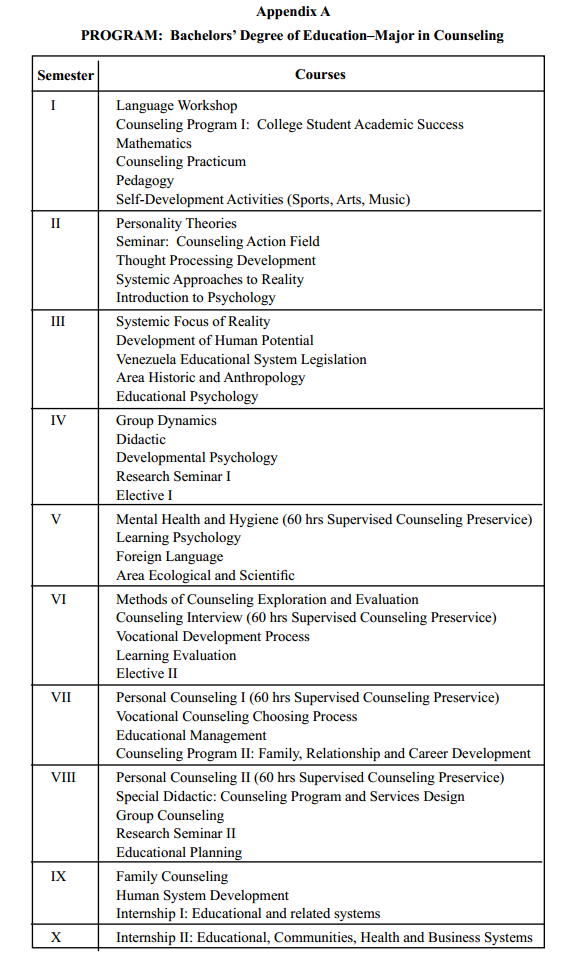George Davy Vera
A personal description of the international counselor education program at the University of Zulia in Venezuela is presented including educational objectives of the counseling degree, various services counselors are trained to provide, and a sample curriculum. This description serves as an example of one international counselor education program that can be used as a model for burgeoning programs in other countries.
Keywords: Venezuela, University of Zulia, international counseling, counselor education, counseling services, curriculum
Venezuela’s early counseling pioneers at the University of Zulia, some of whom were trained in the United States (e.g., Dr. E. Acquaviva, Dr. C. Guanipa, A. Busot, M. Ed.; A. Quintero, M.Ed., M. Socorro, M.Ed., D. Campo, M.Ed.), were pioneers responsible for influencing and crafting the counseling and guidance culture at the University of Zulia. Accordingly, I would like to describe one of the oldest and most well known counseling training programs in Venezuela. This program is chosen because many past and present counseling leaders in Venezuela were educated at the University of Zulia.
Initially in the early 1970s, this bachelor’s level counseling program was conceived as educational counseling (asesoramiento) and vocational guidance (orientación vocacional) as a specialization track within the major of Pedagogical Science. Graduates from this program received a Licentiate in Education, Major in Pedagogical Sciences in the area of counseling (Licenciatura en Educación, Mención Ciencias Pedagógicas, Area de Orientación). According to the University of Zulia’s official archive (1970-2010) on counseling academic and curriculum development, professional services related to individual, vocational or educational counseling and guidance were understood as orientación. Therefore, the Spanish word was implemented to better communicate the meaning of professional counseling and guidance. Historically, the academic choice of using this term at the time was congruent with the Ministry of Education’s decision in 1962, when the terms orientación and orientador were officially adopted to describe guidance professionals and counseling practitioners, respectively. The current bachelors’ degree is five years long (10 academic semesters, for details see Appendix A).
According to the Academic Updated Curriculum Design (Curriculum Commission of Psychology Department, 1995), the education of professional counselors is conceived upon several key concepts:
• Professional identity reflects that graduates are trained to perform counseling and guidance tasks within the educational system and other professional and organizational agencies.
• Counseling professionals help people develop within the social environment, assist with the processes of psychosocial functioning, and effectively deal with developmental changes and stressful life events.
• Professional counselors trained at the University of Zulia are competent in performing counseling tasks such as:
o designing, implementing, and evaluating counseling services.
o developing prevention or remediation programs emphasizing personal, social, academic, vocational, work, recreational, and community needs at any developmental phase using individual or group strategies.
The main educational objectives of the counseling major are:
1. Diagnosing human system characteristics within the educational, organizational, assistance, judicial, and community contexts.
2. Performing counseling and consultation.
3. Designing, implementing, and evaluating services.
4. Generating research in counseling.
Graduates provide counseling services in different areas of human services:
A. Personal-social counselors help clients deal with issues related to social roles and gain more understanding of themselves within their sociocultural context. The main purpose of the personal-social intervention area is to help clients deal with mental health and personal growth issues and to reach psychological stability. In this area, some helping processes are related to:
• psychological development: self-esteem, decision-making, emotional stability, psychosexual maturity, and intellectual potential.
• social development: interpersonal relationships, work and academic motivation, social adjustment, and ethical values.
• family development: prevention, couples relationships, parents and children, family crisis intervention including divorce, terminal and lifelong sickness, bereavement, and human sexuality.
B. Academic counselors help clients deal with issues related to learning and the role of the learner. Helping processes are related to educational adjustment, academic attitudes, cognitive development, academic performance, and consultation with school teachers, families, and communities.
C. Vocational counselors focus on individual talents, vocational potential and tendencies, as well as roles within the workplace. Vocational counselors’ tasks are mainly focused on several facets, including assessment, decision-making, work development, academic needs, workplace readiness, and positive work attitudes.
D. Work counselors provide counseling services to help individuals and organizations with shared objectives to reach mutual satisfaction and development. This area includes process management, career planning and development, work motivation and communication, work-related decision-making, evaluation, conflict resolution, work-service quality, leadership, performance, and teamwork.
E. Community and recreational counselors provide counseling services for community life enhancement. Counseling processes in this area include community resources and needs, civic practices, positive utilization of recreation and free time, community creativity, organization and planning, cultural and artistic manifestations, and social transformation.
Graduates are trained in three core counseling professional competencies:
• Human system diagnostics: use of diverse tools for diagnosing human systems and individual psychological, educational, social and developmental characteristics.
• Program and service design: conceptualize and evaluate human processes in order to design and administer counseling services for individuals, groups, communities, and organizations.
• Counseling and consultation: provide professional services concerning human potential development and to meet psychological, emotional, behavioral, educational, social, organizational, and community needs.
References
Curriculum Commission of Psychology Department. (1995). Counseling education program. Maracaibo, VZ: University of Zulia.

George Davy Vera teaches in the Counselor Education Program, Universidad de Zulia, Maracaibo, Venezuela. Dr. Vera expresses appreciation to Dr. J. Scott Hinkle for editorial comments on an earlier draft of this manuscript. Correspondence should be directed to George Davy Vera, avenida 16 (Guajira). Ciudad Universitaria, Núcleo Humanístico, Facultad de Humanidades y Educación. Edificio de Investigación y Postgrado. Maracaibo, Venezuela, gdavyvera@gmail.com.
